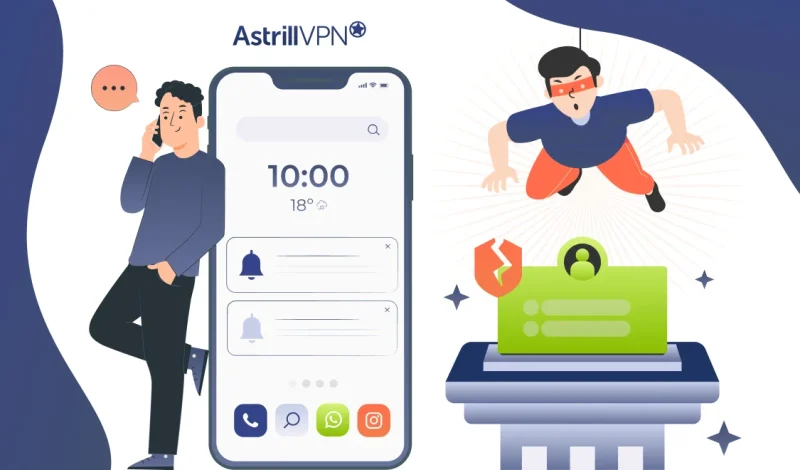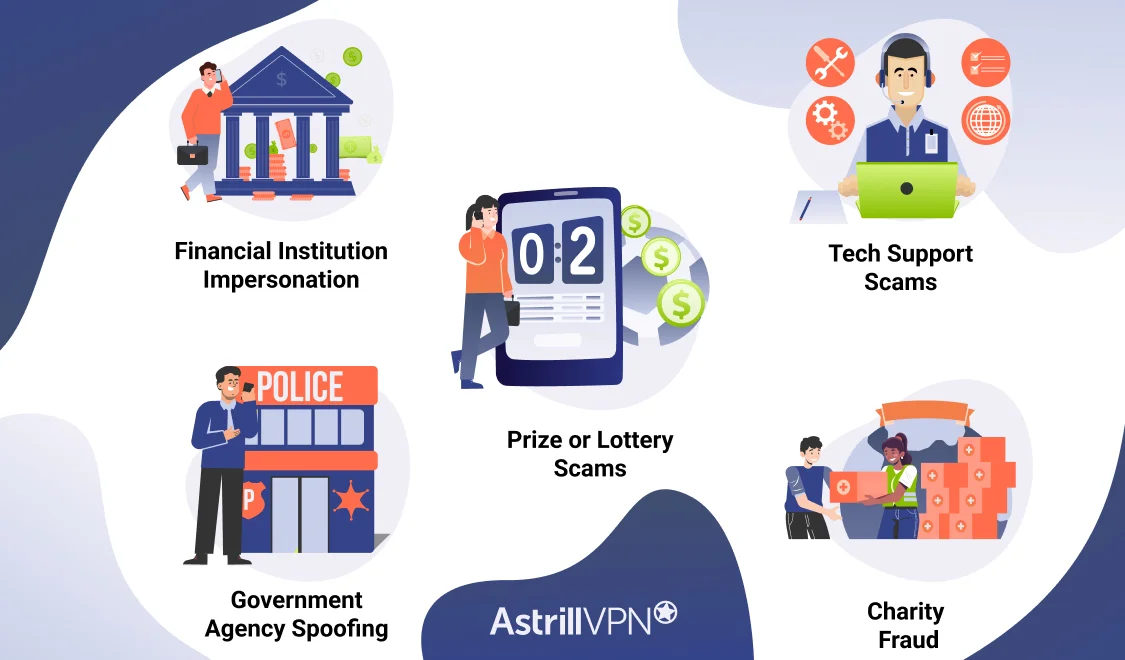Understanding Vishing: What It Is and How to Avoid It?

Bisma Farrukh

Have you ever received a suspicious phone call claiming to be from your bank or a government agency? Vishing, short for “voice phishing,” uses phone calls or voice messages to trick you into divulging sensitive information or taking harmful actions. As technology advances, these scams become increasingly sophisticated and challenging to detect. Understanding what is vishing and how it works is crucial for protecting yourself and your data. In this article, you’ll learn about common vishing tactics and essential steps to safeguard against these deceptive schemes.
Table of Contents
What is Vishing in cybersecurity?
Vishing, short for “voice phishing attack,” is a sophisticated social engineering attack that combines telephony and fraudulent tactics to deceive individuals and obtain sensitive information. This cybercrime technique exploits people’s trust in phone communications, making it a particularly insidious threat in today’s digital landscape.
Key Vishing Statistics for 2024
Here are some key statistics and trends regarding vishing attacks this year:
- Vishing Attack Increase: Vishing attacks have seen a notable 30% increase over the past year, underscoring the rising trend of voice phishing.
- Financial Impact: In 2024, Americans fell victim to vishing attacks, resulting in an estimated loss of $29.8 million.
- Profitability for Scammers: Individual threat agents engaging in vishing scams can earn between $45,000 and $2.5 million annually through the sale of stolen data.
These statistics highlight the growing prevalence of vishing attacks and the substantial financial losses individuals incurred as a result of these deceptive tactics in 2024.
How Vishing Scams Work?
These scams typically unfold in calculated steps designed to manipulate victims into divulging sensitive information or taking harmful actions.
Initial Contact
Vishing attacks often begin with an unsolicited phone call. Scammers may use automated dialers to reach many potential victims quickly. They frequently employ caller ID spoofing techniques to make their calls appear to originate from legitimate sources, such as banks, government agencies, or well-known companies.
Creating Urgency
Once contact is established, vishers use psychological tactics to create a sense of urgency or fear. They might claim suspicious activity on your account, that you owe taxes, or that a loved one is in trouble. This pressure clouds your judgment and prompt quick, ill-considered responses.
Information Extraction
The core of a vishing scam involves extracting valuable information from the target. Scammers may pose as authority figures or helpful representatives, asking for personal details, financial information, or account credentials. They often use a mix of public information and social engineering to sound convincing and build trust.
Exploitation
With the information obtained, fishers can carry out various malicious activities, from identity theft to financial fraud. Some scams might involve directing victims to fake websites or instructing them to transfer money to “secure” accounts, completing the cycle of deception.
Examples of Vishing attack
Vishing scams come in various forms, each designed to exploit vulnerabilities and situations. Understanding these types can help you stay vigilant and protect yourself from falling victim to these deceptive practices.

Financial Institution Impersonation
One of the most common vishing tactics involves scammers posing as representatives from banks or credit card companies. They may claim there’s an issue with your account and request sensitive information to “verify” your identity. Remember, legitimate financial institutions never ask for full account details or passwords over the phone.
Government Agency Spoofing
Fraudsters often impersonate government agencies like the IRS or the Social Security Administration. They might threaten legal action or claim you’re entitled to a refund, pressuring you to provide personal information or make immediate payments. Be wary of unsolicited calls from supposed government officials.
Tech Support Scams
In this scenario, scammers pretend to be from well-known tech companies, alerting you to fictional computer problems. They may request remote access to your device or ask you to purchase unnecessary software. Always initiate contact with tech support yourself using official channels.
Charity Fraud
Some unscrupulous individuals exploit people’s generosity during crises or natural disasters. They may pose as representatives from legitimate charities, seeking donations for non-existent causes. Always verify charitable organizations independently before making any contributions.
Prize or Lottery Scams
These scams entice victims with promises of large winnings but require upfront fees or personal details to claim the prize. Remember, legitimate lotteries don’t require payment to collect winnings, and you can’t win a contest you didn’t enter.
By familiarizing yourself with these common vishing scams, you’ll be better equipped to recognize and avoid them, safeguarding your personal and financial information.
How to recognize Vishing attacks?
Unsolicited Calls and Urgency
Be wary of unexpected phone calls, especially those creating a sense of urgency. Scammers often pressure you to act quickly, claiming immediate action is necessary to avoid dire consequences. Legitimate organizations rarely demand instant decisions or threaten you with account closures or legal action over the phone.
Requests for Sensitive Information
A major red flag is any caller asking for personal or financial details. Reputable companies and government agencies will never request sensitive information like Social Security numbers, credit card details, or passwords over the phone. If you’re asked to provide such data, it’s likely a vishing attempt.
Unusual Payment Methods
Be cautious if the caller insists on specific, often unconventional payment methods. Requests for wire transfers, gift cards, or cryptocurrency should raise suspicion. These payment forms are difficult to trace and often favored by scammers due to their irreversible nature.
Caller ID Spoofing
Don’t blindly trust caller ID. Vishers can manipulate phone numbers to appear as if they’re calling from a legitimate organization. If you’re unsure, hang up and call the company directly using a number from their official website or a recent statement.
Emotional Manipulation
Scammers may try to exploit your emotions, whether through fear, excitement, or sympathy. Be skeptical of calls that affect your feelings, especially if they’re coupled with requests for money or personal information.
Pressure Tactics
Vishers often create a sense of urgency to manipulate victims into hasty decisions. They might claim your account has been compromised or that you’re facing legal trouble. Remember, reputable entities allow time for verification and don’t rush you into action.
Tech-savvy Tricks
Some vishers use caller ID spoofing to make their calls appear to come from legitimate sources. Don’t trust caller ID alone; always independently verify the caller’s identity using official contact information.
Stay alert to these warning signs can significantly reduce your risk of catching vishing attacks.
How to Prevent Vishing in 2024
Be Skeptical of Unsolicited Calls
When receiving unexpected calls, especially from unfamiliar numbers, maintain a healthy dose of skepticism. Legitimate organizations rarely initiate contact to request sensitive information over the phone. If a caller claims to represent your bank, credit card company, or a government agency, politely end the call and contact the organization using a verified number from their official website or your account statement.
Never Share Personal Information
Protect your sensitive data at all costs. Avoid disclosing personal details such as Social Security numbers, credit card information, or account passwords over the phone. Legitimate entities already have this information and won’t verbally ask you to provide it.
Utilize Call-Blocking Technology
Take advantage of call-blocking features offered by your phone service provider or third-party apps. These tools can help filter out known scam numbers and reduce the likelihood of falling victim to vishing attempts. Remember to regularly update your blocked number list to protect against evolving threats.
Educate Yourself and Others
Stay informed about the latest vishing tactics and share this knowledge with friends and family, especially those more vulnerable to such scams. By raising awareness, you can strengthen your defense against these malicious actors and help protect your community from potential financial and emotional harm.
How to Handle a Suspected Vishing Call?
Stay Calm and Alert
If you receive a call you suspect might be a vishing attempt, remain calm. Scammers often try to create a sense of urgency or fear to manipulate you. Take a deep breath and approach the situation with a clear mind. Remember, legitimate organizations won’t pressure you to make immediate decisions.
Don’t Disclose Personal Information
Never provide sensitive details like your Social Security number, credit card information, or passwords over the phone, especially if you didn’t initiate the call. A genuine company or institution should already have this information on file and won’t ask you to verify it in this manner.
Verify the Caller’s Identity
If the caller claims to be from a company or organization you do business with, politely end the call and contact the entity directly using a phone number you know to be legitimate. This lets you confirm whether the call was genuine or a vishing attempt.
Report Suspicious Calls
If you believe a vishing scam has targeted you, report it to the appropriate authorities. This may include local law enforcement, the Federal Trade Commission (FTC), or your state’s consumer protection office. Your report can help prevent others from falling victim to similar scams.
Educate Yourself and Others
Stay informed about the latest vishing techniques and share this knowledge with friends and family, especially those more vulnerable to such scams. The more aware people are, the harder it becomes for scammers to succeed.
Reporting Vishing Scams and Fraud
If you suspect a vishing scam has targeted you, it’s crucial to act quickly. First, end the call immediately and don’t provide any personal information. Next, contact your bank or credit card company if you’ve shared financial details. Be sure to change any compromised passwords or PINs right away.
Conclusion
As vishing attacks become increasingly sophisticated, protecting yourself requires ongoing vigilance. Stay informed about the latest scam tactics, be skeptical of unsolicited calls, and never give out sensitive information over the phone. Enable caller ID and block suspicious numbers. If you need clarification on a call’s legitimacy, hang up and contact the company directly using a verified number. Educate family members, especially older adults, about vishing risks. By remaining alert and following security best practices, you can significantly reduce your chances of falling victim to these deceptive schemes.
Frequently Asked Questions
Any unsolicited call requesting personal or financial information is likely a vishing attempt. Be especially wary of calls claiming to be from government agencies, banks, or tech support services that you should have initiated contact with. Legitimate organizations rarely make unexpected calls asking for sensitive data.
Vishing attacks have become increasingly prevalent in recent years. According to the Federal Trade Commission, Americans alone lost over $1.9 billion to phone scams in 2022. The COVID-19 pandemic has further fueled this trend, with cybercriminals exploiting people’s fears and uncertainties.
While not all robocalls are vishing attempts, many are. Scammers often use automated calling systems to reach many potential victims quickly. These calls may prompt you to “press 1” to speak with a representative, who then attempts to extract sensitive information.
Only give out personal information over the phone if you initiated the call to a trusted number.
Use caller ID, and don’t answer calls from unknown numbers. If the call is important, they’ll leave a voicemail.
Remember, staying informed and skeptical is your best defense against vishing attacks.

No comments were posted yet